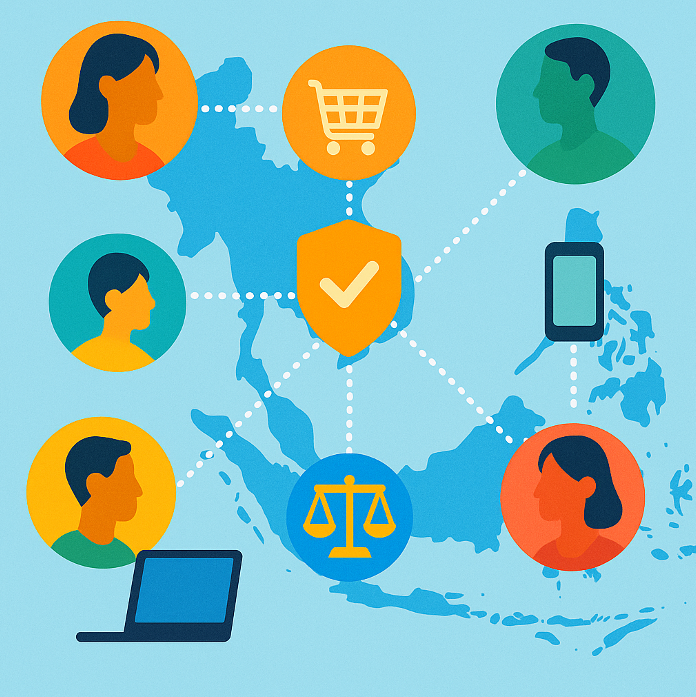The extensive use of free service providing websites by netizens aligned with ignorance of their copyright violation while accessing such websites is an issue for deliberation. Free service providing websites can collect the unpublished copyrighted work of users to provide the services and collecting unpublished work is the basic pre-requisite without which their existence and service offering shall cease to exist. These websites generally provide free services such as checking the grammatical content of work, paraphrasing the content, converting the format of document, editing the image and so on. To avail these services, unpublished copyrighted work in form of document, image or paragraph may be uploaded by beneficial user as being indispensable obligation. Collecting unpublished work by free service websites becomes a requisite that cannot be waived as the user intends to secure free service by voluntarily uploading the unpublished copyrighted work. An indirect copyright violation occurs when the unpublished copyrighted content is stored, processed, or redistributed to third parties without permission from authors by free service websites, or when paraphrasing tools generate derivative works. As a result, non-existence of compliance requirement as to reporting the volume and kind of data collected by such websites to an existing data regulatory body pushes them to benefit from the unauthorized use of received copyrighted material.
Published and Unpublished Copyrighted Work
The Berne Convention for the Protection of Literary and Artistic Works ensures that copyright protection is automatic upon the creation of a work. According to Article 5(2), both published and unpublished works enjoy copyright protection without any formalities. This means that users personal writings and photographs are protected as soon as they are created.
Article 9 (2) of the Berne Convention sheds light on the doctrine of fair use with a limitation that “such reproduction does not conflict with a normal exploitation of the work and does not unreasonably prejudice the legitimate interests of the author”. The author of work has the right to control over the public release of work and the scope of fair use doctrine is narrow for an unpublished work. Even if a work is unpublished, it is still protected by copyright. Copyright laws do not require publication for protection, the mere creation and fixation of a work in a tangible medium grant copyright protection. Therefore, any unpublished copyrighted content uploaded to free service websites remains copyrighted. For instance, any copyright derived by an author writing a paragraph or book and a photographer clicking a photograph is the original work of that author who is vested with copyright.
A complication arises only when the user benefits from the use of those free services providing websites for their work which can further benefit the free service websites seeking the umbrella of Fair Use. Also, there exists an ambiguity as to whether the unpublished and uploaded copyrighted work received by free service websites falls within the ambit of fair use principle under copyright law.
Fair Use: Educational or Commercial?
Free service websites can face scrutiny particularly when sharing the copyrighted content. Although many such platforms may argue that their service providing qualify as fair use, success largely hinges on whether the use is transformative. For instance, a website providing summaries or educational resources may claim transformation by offering added commentary, analysis, or new insights. However, transformation alone doesn’t guarantee fair use; other factors such as the amount of original content used, and potential market impact are also essential.
If free service websites share the copyrighted content of the users even with minimal changes, they still do not meet the transformative use standard, as decided in the case of Harry Potter encyclopedia, where only slight transformation will not prevent copyright infringement claims. Educational and archival uses, such as those by libraries or research databases, typically have stronger fair use defenses, as their purpose often differs from the original commercial aims. Free service websites operate with a commercial aim with the premium plans offer users enhanced features, including quicker processing times, larger file size limits, and access to tools like optical character recognition. Further, the presence of paid options and emphasis on extra features for subscribers reflect a revenue-driven commercial model. However, free distribution alone, without a solid transformative basis, may not qualify for fair use. Ultimately, whether free service websites are protected by fair use will largely depend on the purpose of the use, the extent of copyrighted content used, and the impact on the original work in market.
Transformative Use by Free Service Websites
For the free service websites to effectively argue fair use through transformative use, they must demonstrate that it had meaningfully modified or repurposed the educational content to create a distinct, valuable function beyond simply hosting or sharing the original material. If the content is used in its entirety, remains unpublished, and the website operates with a commercial aspect, its fair use claim becomes weaker. Ultimately, whether fair use applies would depend on whether the website’s use truly transforms the content or simply reproduces it for its original educational intent.
If the website utilizes the complete educational content, claiming fair use becomes more difficult, as typically only a portion would be adequate for a transformative purpose. The argument for transformative use is bolstered when only small, non-substantial segments of the content are employed, particularly if those segments are crucial to the transformative intent. However, the transformative use cannot be a defence if the work is still unpublished by the user.
Conclusion
Websites providing free services must inform users about data collection practices, including what data is collected, who might receive it, and how long it will be stored. Stringent international legal framework is necessary to mandate entities to document all processing activities to ensure compliance. The intersection of data privacy and copyright law is complex, especially concerning free service websites. Users must be aware of the risks involved in uploading their content. These websites must adhere to general copyright principles and ensure transparency and accountability in their data practices. Protecting personal and unpublished copyrighted information is essential to maintain user trust and uphold the principles of fair trade and data privacy.
Author
Mili Gupta is Assistant Professor, School of Legal Studies, Reva University, Bengaluru, India.
Gagneet Singh is Post-Graduate Paralegal Student, Humber Polytechnic, Ontario, Canada.





